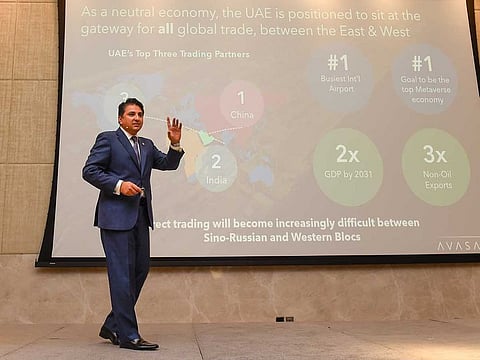Gulf economies have done well turning into fast-track adopters of tech: Avasant report
AI and the Metaverse will propel speed of adoption into real-world uses

Dubai The early identifying and adapting of new-age technologies has enabled GCC economies to meet their goals of economic diversification, improve services to citizen, and drive innovation, a report by the consultancy Avasant said.
Most importantly, both public and private sector can be seen investing in these technologies hand-in-hand, the study - titled ‘Creating a sustainable technology-enabled economy’ - said. “This has led to heavy public and private spending on AI, blockchain, Metaverse, and other digital technologies to upgrade payment systems, enhance healthcare, standardize land records, provide virtual experiences, and other use cases. This focus will likely continue and increase over the next decade.”
Bulk of the digital investments have been seen by the banking (22 per cent) and financial services (16 per cent) sectors, followed by telecom, media and entertainment (10 per cent), government (9 per cent), insurance (8 per cent), retail and consumer packaged goods (7 per cent). Sectors such as healthcare and life sciences, aerospace and defence have seen the least investments, the report shows.
Region specific
Increased cooperation between the GCC countries has also driven trade facilitation and technology adoption. Alliances between chambers of commerce of Bahrain and Oman in October 2022, a policies and systems integration between UAE and Kuwait to set up a virtual trade corridor in March, and a pilot initiative between Saudi Arabia and Bahrain that uses smart technology to help trucks cross the King Fahd Causeway 12 times faster were some of the pacts that have delivered instant results.
100% FDI
The report touched upon the role allowing 100 per cent ownership in companies and development of free zones has played in fast-forwarding economic reforms in the Gulf economies. “Large GCC economies have implemented reforms in commercial laws, pegged their currencies to the US dollar, eased investment processes, allowed 100 per cent foreign ownership, developed free zones, and signed trade deals with strategic countries,” the report adds. They have also amended immigration laws to access foreign talent.
“As a result, banking, financial services, insurance, and real estate sectors now receive higher FDI than the traditional oil and gas sector. Manufacturing, retail, and tourism have also seen FDI acceleration.”
Success stories
The Expo 2020 and Dubai Silicon Oasis are some of the success stories of leveraging state-of-the-art tech. “Dubai Police made Expo 2020 events safe and secure by applying AI and machine learning to data gathered through robots and drones to predict and prevent potential criminal activity,” Avasant notes. “Driverless vehicles with 4D imaging radars and face recognition were used to communicate with police control rooms directly to minimise response time.
“The Dubai Silicon Oasis is a community with homes, offices, commercial space, education, green space, etc. It offers innovators an ideal testing ground in a city-like environment in collaboration with the some of the brightest minds and global corporations that are part of its ecosystem. Currently, DSO’s piloting zone is being used to develop innovations in drone technology and delivery by global and regional corporations. The vision for DSO is to establish a truly autonomous city.”
Sign up for the Daily Briefing
Get the latest news and updates straight to your inbox



